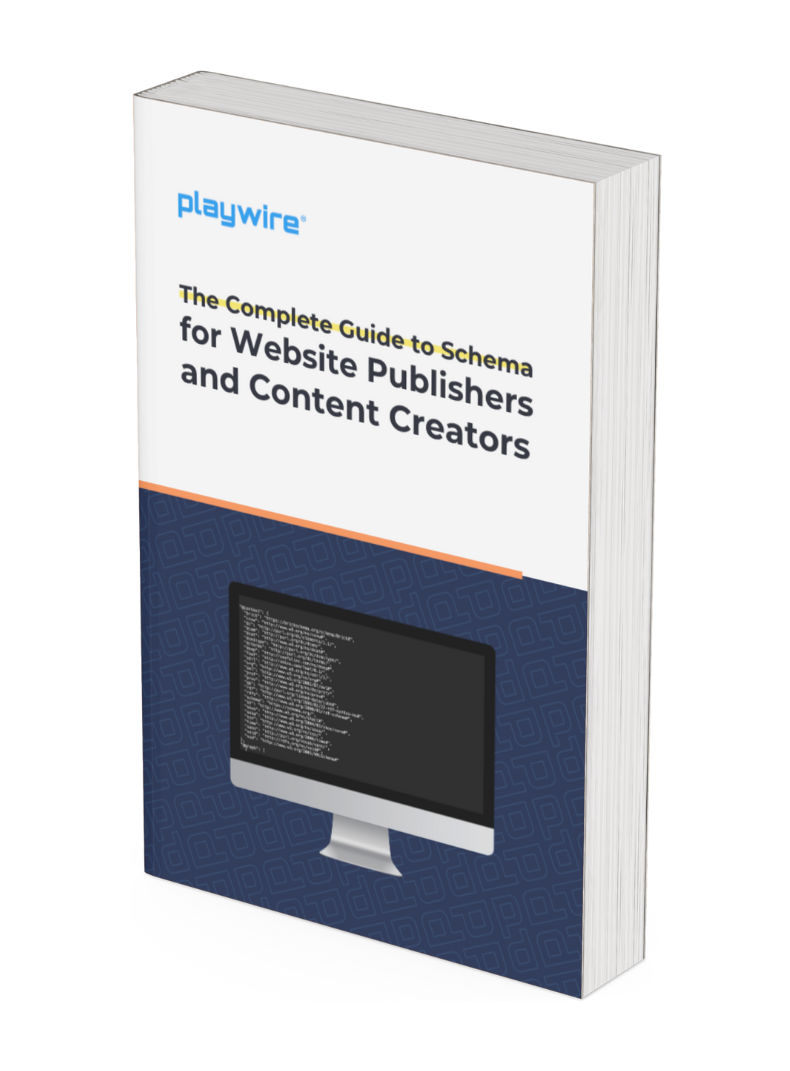
The Complete Schema Resource Center
What is Schema?
Schema — also known as structured data — is an element of technical SEO that involves adding code to your website’s infrastructure to help search engines better understand your content.
Search engines read this information, and, when added correctly, it works in tandem with other SEO practices to increase your chances of ranking higher in search results and reaching the right audience.
There are three unique formats for schema markup, but the most user-friendly (and, naturally, most popular) format is JSON-LD.

The Complete Guide to Schema for Website Publishers and Content Creators
GUIDE
Learn everything you need to know about schema with this comprehensive guide from Playwire's content, data, and digital monetization experts.
Schema Markup:
Why is Schema Important for SEO?
Gain a better understanding of the power of technical SEO and schema, and why schema markup is critical for helping search engines understand your content.SEO for Publishers: Schema for SEO Basics
Schema is a highly technical SEO strategy, but there are several best practices publishers can follow to get started. Discover basic but essential SEO tips for publishers like you.9 Schema Tools for Website Publishers and Content Creators
There are many schema tools available — both free and paid — to help publishers create and implement a seamless schema strategy. Check out the most important that you need to know.How to Incorporate Schema for SEO on Your Website
Incorporating schema markup is essential for SEO, but the process can be highly technical. Explore how to remove some of the complexity of incorporating schema markup for SEO on your website.Playwire Live: Schema and SEO for Publishers and Content Creators
ARTICLE + VIDEO
From Google’s latest algorithm updates to the infiltration of AI-generated content across every corner of the Internet, the current SEO landscape is dynamic, unpredictable, and as a result, creating a myriad of new challenges for publishers.
To better understand this new era for SEO, we sat down for an important Playwire Live episode with technical SEO expert and owner of Narrative SEO, Franco Valentino.
During the virtual event, Franco delivers his “10 SEO Must-Haves,” a framework any publisher can use to cover the non-negotiables of SEO and ensure their websites are technically sound and optimized for search. Click below to dig in!
Based on Vertical or Niche
SEO for Publishers: 4 Advanced Schema Tips
ARTICLE
Go beyond schema basics in this article, which digs into several essential schema tips you can use to take your digital publishing game to the next level.
From increased visibility to higher click rates, leveraging advanced schema techniques can help you stand out and find the competitive edge in Search Engine Results Pages (SERPS).
Learn four actionable schema strategies to transform your website into a technical SEO powerhouse.
Advanced Yield Analytics Drive Strategic Business Decisions for GTPlanet

2X
36%
Frequently Asked Questions About Schema
What is technical SEO?
While there are many different types of SEO strategies, there are three main SEO types: on-page SEO, off-page SEO, and technical SEO.
Technical SEO is the least outwardly visible of the three strategies, but without it, the on-page efforts won’t even be seen, let alone effective. Technical SEO focuses on the back end and infrastructure of your site.
This includes things like:
- Page speed
- Mobile Optimization
- Crawlability
- Content structure
- Meta tags
- SSL certificates
- URL structure
- XML sitemaps
- And structured data markup — AKA schema.
What are the benefits of adding schema to my website?
- Enhanced communication with search engines: The primary reason why schema is important for SEO is that it helps search engines read and understand the content and context of your web pages. This increases the likelihood of it moving up the search engine results page (SERP) and being delivered to the right eyeballs.
- Enriched results and rich snippets: Schema is designed to support rich snippets in Google search results. Enriched results greatly impact your click-through rate (CTR) because they are front and center and offer important information based on exactly what readers are searching for.
- Improved CTR: Schema isn’t a direct ranking factor for SEO, but it can improve engagement metrics like CTR and enhance your visitor’s overall experience.
- Improved local SEO: Local business schema provides critical information about your physical location and contact methods, which helps the search engine direct your content to the most relevant readers in your area.
- Voice search optimization: Voice search is becoming an increasingly popular method of searching; over half of American consumers reported using voice search at least once per day. Schema improves voice search results by providing specific and detailed answers to commonly asked questions.
- Increased chance of being a featured result: Using the correct schema can increase your chances of being a featured snippet — the highlighted section at the top of a search results page that provides a direct answer to a query.
How do I add schema to my website?
There is quite a bit that goes into implementing a schema strategy on your website or blog. Here are the primary steps for doing so.
- Choose the schema format. There are three main formats: Microdata, RDFa, and JSON-LD (the most commonly used schema format).
- Choose the schema type. It's imperative that you identify which schema types apply to your specific content type. Here are several core schema types that Google supports: Article schema, Book schema, Breadcrumb, Discussion forum, Event schema, Job posting, Local business, Product schema, FAQ schema, Recipe schema, and Review snippet. Keep in mind, that this is not an exhaustive list.
- Create the schema markup. You can either write your structured data manually or use a schema generator or plugin to generate your site's schema.
- Add the schema to your site's HTML. Copy the markup code you generated (or, wrote manually) and paste it into your HTML document. There are two options for where to put it:
- In the <head> section
- Just before the closing </body> tag
- Validate your schema markup. Make sure to validate your structured data in the official schema markup validator tool.
- Monitor performance and make adjustments. Be sure to monitor your site’s performance with reporting tools, such as Google Search Console, and make adjustments to improve your search results as needed.
Dig further into each of these steps in our in-depth article on incorporating schema markup for SEO on your website.
What are the best schema tools?
Some of the most important tools for successfully creating and incorporating schema into your content strategy include:
- Schema.org Validator
- Google Structured Data Markup Helper
- Google Rich Results Test
- JSON-LD Generator
- Schema & Structured Data for WordPress & AMP
- WP Recipe Maker
- SEO Ultimate
- Yoast SEO
- Rank Math
Interested in learning more about how to effectively utilize each of these schema tools? Read the full article.
What is schema.org?
Think of schema.org as your guidebook. It’s the penultimate resource for all things structured data.
Everything you want to know about writing and implementing schema on your website can be found on the schema.org web pages.
This includes things like:
- Vocabulary: In-depth listings of all the definitions you may encounter as you learn about schema.
- Style guide: Instructions for how to name and write schema markup.
- Schema listings: A hierarchically organized list of every schema type.
- Schema validator: A structured data testing tool that validates the schema code embedded in your web pages to ensure everything is written and being read correctly.
Real talk: You probably don’t want to read this guidebook cover-to-cover as it is mostly technical jargon, but it’s an important resource to reference as it contains the answers to all the questions you might encounter along your schema journey.
What are rich snippets?
Rich snippets are a technical SEO essential for publishers. In fact, research shows that snippets receive around 35% of the total clickshare on SERPs.
These enhanced search results go far beyond standard titles and descriptions. They can include everything from images and star ratings to FAQs and other eye-catching elements. Snippets stand out in search results; it’s as simple as that.
With the right approach to and implementation of schema markup, publishers can trigger rich snippets. Here are some examples:
- Review Snippets: These display star ratings and review summaries, perfect for product pages, local business listings, or any content with user-generated reviews. The magic behind these snippets is the Review schema, which tells search engines the rating value and the number of reviews.
- Recipe Snippets: Hungry searchers love recipe sites! These snippets show cooking time, ratings, and even images right in the search results. The Recipe schema is your key to unlocking these delicious snippets.
- HowTo Snippets: Guide readers through tasks with step-by-step instructions that appear in search. The HowTo schema makes this happen.
Here’s an extra tip: Use Google's Rich Results Test tool to learn if your schema markup is eligible for rich snippets and to troubleshoot any potential issues.
Amplify
Your Ad Revenue
Accelerate your business and uncomplicate your ad tech stack, because you deserve a partner and a platform that demands more for you.